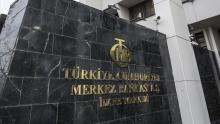Monetary economics
Decline in inflation likely to spur share of lira deposits: Central Bank
Declines in inflation over the next months will further boost the rise in the share of Turkish Lira deposits in total, according to a post on the Turkish Central Bank's blog.
The share of lira deposits in total deposits grew from 48.4 percent to 51.8 percent in July-August, the blog post by researchers and economists working at the bank stated.
Central Bank keeps key interest rate unchanged at 50 percent
As widely expected, the Central Bank has opted to keep the policy rate, the one-week repo auction rate, stable at 50 percent.
China consumer prices rise in February
Chinese consumer prices rose in February for the first time since August, data showed on March 9, bucking a months-long stretch of deflation that compounded the country's myriad economic woes.
The world's second-largest economy posted some of its lowest growth in decades last year and is battling a prolonged property sector crisis and soaring youth unemployment.
- Read more about China consumer prices rise in February
- Log in to post comments
Supermarket sales expand despite growth in cost of food
Greeks remain inflexible on food spending since, despite the reduction in disposable income due to constant price hikes, the expected reduction in sales volume, which would probably also work in the direction of deflation, has not happened.
More price hikes on the way
Over one in five small and medium-sized enterprises plans to raise their prices of goods or services in the second half of 2023, showing that inflationary pressures will continue for some time to come.
- Read more about More price hikes on the way
- Log in to post comments
China slips into deflation as post-COVID recovery falters
China slipped into deflation for the first time in more than two years in July, official data showed yesterday, as slowing domestic spending weighs on the post-COVID economic recovery.
The reading comes a day after news that the country suffered its biggest fall in exports since the early days of the pandemic, while imports tanked again as domestic and global demand fall away.
Lower demand for new loans
Banks are expecting a decrease in demand for business loans, especially from small and medium-sized enterprises, in the second quarter of the year, as a result of the rise in interest rates and the increase in the cost of money, which discourages borrowing.
- Read more about Lower demand for new loans
- Log in to post comments
Central Bank keeps inflation forecast unchanged
The Central Bank has not changed its 2023 inflation forecast and maintained its year-end consumer price index at 22.3 percent.
- Read more about Central Bank keeps inflation forecast unchanged
- Log in to post comments
Eurostat pegs inflation in Greece at 9.8% and 10.7% in the eurozone in October
Harmonized inflation in Greece "fell" to 9.8% in October, according to Eurostat data. At the same time, the consumer price index in the eurozone increased by 10.7%, setting a new record.
Editorial: Prices and wages
The COVID-19 pandemic, beyond the public health crisis that it created, disrupted the supply chain internationally.
Ports were underfunctioning for a protracted period. Workers there were suspended, contracts were not executed, and therefore international transport was rocked by the pandemic.
- Read more about Editorial: Prices and wages
- Log in to post comments










